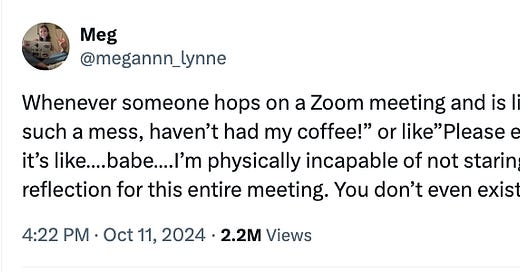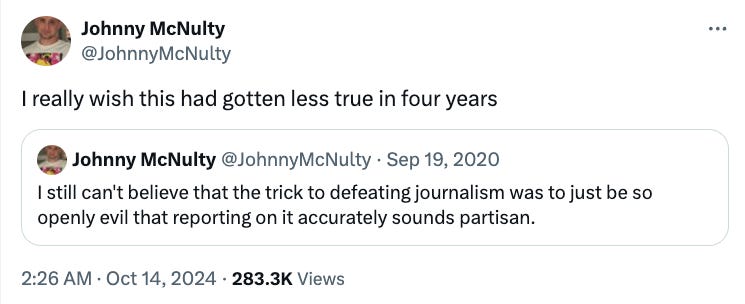Hello if you’re new here, each week Bruce Daisley curates the best new headlines from the world of workplace culture. It’s fabulous and free. Sign up now.
A number of studies into the real work impact of RTO policies were published:
Office usage had no impact on future profits or stock returns
RTO mandates tended to be implented as a reaction to bad corporate results
RTO mandates were more likely in firms run by older, male CEOs
RTO mandates led to resignation of longer tenured employees
RTO mandates led to employee sentiment falling (eg Glassdoor ratings)
Professor Nick Bloom shared his slides from his recent talk about the ‘The Future of WFH’. Key points:
Despite RTO mandates and attention grabbing headlines WFH days have been broadly unchanged in 2 years
Office occupancy has flatlined at 50% of 2019 levels. (It is inevitable that this will change and firms will downsize)
Employees value 2 or 3 days hybrid working to be worth around 8% more pay
Productivity seems to have zero impact on productivity but does increase employee happiness (quit rates fall by about a third)
Employees are living further from work, pushing suburban house prices higher
Two weeks ago I shared Annabelle Black’s LinkedIn post about how her burnout from a career in advertising led her to dark thoughts about whether she wanted to carry on living. This week she posted a longer piece reflecting on why we’re reluctant to discuss themes of suicidal ideation and the role that work can play in creating such destructive thinking. In fact Annabelle cites a 2023 academic paper which find that ‘Exhaustion is linked with risk of suicidal ideation in employees regardless of depression status’
Survey data suggests that companies are paying higher salaries for in-person jobs (up 20% more)
In Boston, MA the high office vacancy rates have left a huge fiscal blackhole in state finances which means tax bills on individuals are set to increase by 28%
The BBC has begun a review into its workplace culture to prevent hierarchial abuses of power
Slightly off topic but fascinating, playing Tetris protects against the invasive thoughts of PTSD - more brilliance from Elspeth Kirkman
The CIPD published a full guideline to the new Employment Rights Bill
Guess the profile of the person who made this decision: Dell gave employees 2 days’ notice that they need to be back in the office 5 days a week leaving staff scrambling to find childcare to cover them while they go for interviews
Utterly delighted to see If Books Could Kill tackle the worst ‘layoff propaganda’ book of all time, Who Moved My Cheese (includes an outstanding takedown of the transition to stakeholder capitalism that gave context to the book):







When it comes to mental health at work, I have found Christophe Dejours' work incredibly insightful: https://www.eyrolles.com/Loisirs/Livre/travail-vivant-volume-2-travail-et-emancipation-9782228908405/ He is a "work psychiatrist", something that probably only exists in France, which explains why he has such a deep understanding of how work can negatively impact but also often be the way out of mental health challenges.
Unfortunately there does not seem to be any English translation of his books. I have found this article which is a good introduction to some of his counter-intuitive ideas: https://www.philonomist.com/en/interview/suffering-starting-point-workers-intelligence
Awesome post as always. This one has so many gems. I love it that Who Moved the Cheese is getting what it deserves. I hated that book from the first moment I had to read it as part of a "realignment" exercise in one of my first companies. But a surprising number of people find it a valuable book which says a lot about the state of the workplace.
I also wanted to ask if you have any insights into why the research about RTO is so widely divergent. Some research seems to show that creativity, collaboration is much better back in the office as well as mentorship for younger staff. However there also seems to be a lot of studies that show much better results from continued WFH. Is a key influence the general stagnation of productivity as a whole? Eg: no matter what you do it doesn't move much. Or is something else going on?